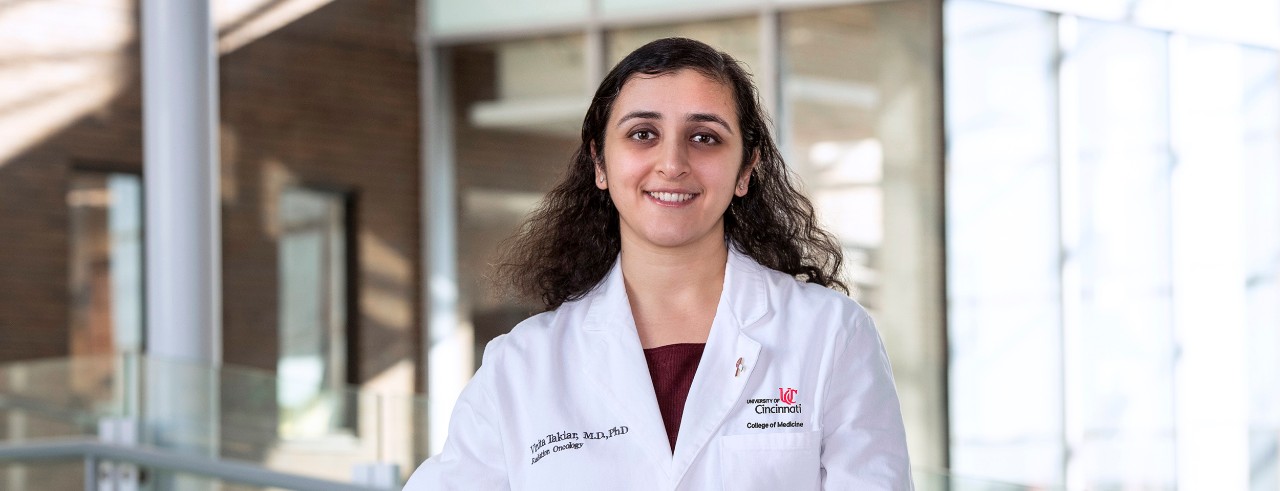
Combating resistance to radiation
$1.4M VA grant will help UC researcher study radiation resistance in patients with head and neck cancers
A University of Cincinnati cancer researcher received a $1.4 million federal grant to study radiation resistance in head and neck cancer and ways to target molecular pathways in patients to make this form of treatment more effective.
The five-year U.S. Department of Veterans Affairs (VA) Career Development Award will help principal investigator Vinita Takiar, MD, PhD, assistant professor of radiation oncology at the UC College of Medicine and a UC Health radiation oncologist, examine this problem in veterans.
“Head and neck cancer is the sixth most common cancer worldwide and is diagnosed twice as frequently in veterans. Unlike other sites of the body, where cancers can be removed surgically, the head and neck is a difficult area in which to operate, and there is not as much that can be removed before there is functional impairment for the patient,” she says. “Radiation is a good option in certain cases, and there are clear benefits to radiating the tissue to prevent disease recurrence, even after surgery. However, even after high doses of radiation, which cause significant side effects to the patient, the tumor can reappear within the treated area. We want to understand how this happens and then target those pathways to make radiation more effective.”
This research will lay the groundwork for future clinical trials and is expected to identify additional unknown, yet effective treatment combinations (for head and neck cancer).
Vinita Takiar, MD, PhD
Takiar, also a member of the UC Cancer Institute, says the study will use Reverse Phase Protein Arrays (RPPA), a protein microarray tool, to strategically identify and compare treatment combinations that could target various molecular pathways and combat therapy resistance. The use of RPPA to identify new therapies to be used in combination with radiation has not been investigated previously.
“This study will hopefully help us combine newly identified targeted treatments with radiation therapy to result in maximum treatment efficacy while minimizing side effects,” she says, noting that nearly all patients who currently get a combination therapy have limited options, with most getting cisplatin, a type of chemotherapy. “We will start by looking at the combination of radiation therapy with a glutaminase inhibitor, known as CB-839, to see if it makes cancer cells in culture more likely to die from radiation.”

Vinita Takiar, MD, PhD. Photo Credit: Colleen Kelley / Communication Services
By blocking glutaminase, a derivative of glutamine (an amino acid used in the biosynthesis of proteins), the energy producing machinery of cells becomes impaired, making it harder for cells that are damaged by radiation to repair themselves and continue to survive.
Takiar adds that researchers will validate the efficacy of glutaminase inhibition by testing it alone and in combination with radiation therapy. She and her team will also work to identify other new head and neck cancer cellular pathways that are altered by radiation therapy using samples taken from patients, treating them with radiation and then looking at their molecular changes.
“This research will lay the groundwork for future clinical trials and is expected to identify additional unknown, yet effective treatment combinations,” she says. “The treatment of head and neck cancers in the VA population deserves special consideration because of the patient population’s risk factors, overall outcomes and cost of their care. We hope this study will lead to more effective treatment for veterans with head and neck cancers and eventually help others with the disease.”
Featured Photo: Vinita Takiar, MD, PhD. Photo Credit: Colleen Kelley / Communication Services
Related Stories
Machine learning brings new insights to cell’s role in...
April 30, 2025
Researchers led by the University of Cincinnati’s Anna Kruyer and the University of Houston’s Demetrio Labate have published research in the journal Science Advances applying object recognition technology to track changes in brain cell structure and provide new insights into how the brain responds to heroin use, withdrawal and relapse.
Most teens prescribed SSRIs did not have recommended follow-up...
April 30, 2025
The University of Cincinnati and Cincinnati Children's Hospital Medical Center's Martine Lamy commented to Medscape on new research that found fewer than half of the adolescents prescribed a selective serotonin reuptake inhibitor (SSRI) at two large Chicago pediatric primary care clinics had a follow-up visit within the recommended 6 weeks.
UC recognizes students for innovation achievement and leadership
April 30, 2025
Read about the University of Cincinnati’s undergraduate innovation awards for 2025.
